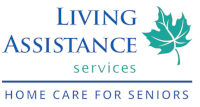Over 90% of Ontario residents over the age of 55 want to age in place, according to recent research. This is something that’s entirely possible for many Canadians, but only with the appropriate systems in place to ensure their safety and well-being. This may include consistent family support as well as the assistance of skilled, dedicated caregivers. It could also involve making changes to their home in order to reduce risk and improve quality of life.
At Living Assistance Services in Toronto, we strive to help seniors live safely and independently in their own homes for as long as possible. Here are some practical tips for making your aging loved one’s home as safe as possible—if you have any questions or would like to learn more about our homecare services, please contact us.
Reduce the risk of falling
Falling is a major health and safety risk for seniors that can lead to injury, hospitalization or even death. As stated by the Public Health Agency of Canada, “In Canada, falls are the leading cause of injury-related hospitalizations and injury deaths among people aged 65 or older. Injuries from falls reduce older adults' quality of life, increase caregiver demands, and precipitate admissions into long-term care.” To reduce your loved one’s fall risk, consider removing rugs, clearing away any clutter and using assistive devices as needed (more on that below). You can also encourage your aging loved one to wear anti-slip shoes or slippers in the house. Engaging in both passive and active Range of Motion exercises helps strengthen and condition the body to be better balanced and strong. By taking action to reduce the risk of a fall, you’re helping your aging loved one remain safely in their own home. Meet with your health team regularly to review your medications and health conditions. Urinary tract infections, heart fibrillations and neurological changes can cause an increased risk for falls.
Add grab bars and other assistive elements
A lot of falls happen in the bathroom, but there are simple solutions to help reduce your aging loved one’s risk and prevent injuries. Start with a raised toilet seat (if needed) as well as grab bars near the shower entrance as well as the toilet. Add anti-slip materials to the inside of the shower and/or bath tub, install a shower seat, and consider adding anti-slip materials to the floor if it’s tile that becomes slippery when wet. In the bedroom, consider a bed rail and/or grab bars near the bed. If a wheelchair, walker or other device is used for mobility assistance, you may also want to consider adding a ramp or lift as well as widening door frames as needed. Please note that while there used to be a tax credit to support these accessibility-based home improvements, it is no longer available. You can contact both public and private home care services to arrange a Home Safety Assessment. If eligible, the Assistive Devices Program may cover up 25% of the costs for most equipment and supplies.
Consider smart home features
Falling isn’t the only risk to seniors—it’s important that they can recognize the signs of a stroke, heart attack or other serious medical event. They should also be able to communicate with family and/or other caregivers if they feel simply unwell or require non-emergency assistance. If your aging loved one is home alone for periods of time, they need an easy, effective way to call for help in the event of an emergency—even if they’re unable to get to the phone. Smart home features can assist seniors with communication as well as entertainment and small tasks around the house. Consider purchasing a voice-operated Google Home or Amazon Alexa that can be used to call family members or emergency services as needed. A smart watch may also be helpful and for less tech-savvy seniors, a wearable Lifeline product or similar product can provide safety and peace of mind. Look for an option that has a fall detection system built in!
Contact us to learn more about homecare services for seniors in Toronto
Your aging loved one’s safety, well-being and quality of life is our top priority, and we’re dedicated to treating seniors with the same care and respect we’d offer our own family members. To learn more or get a personalized quote for homecare services in Toronto and the surrounding areas, please contact us. We’d be pleased to answer your questions, tell you about our Personal Support Workers (PSWs) and discuss your family’s homecare needs.
Here’s some additional reading on this subject:
Aging in Place (National Institute on Aging)
Thinking About Aging in Place (Government of Canada)
New Poll Shows Over 90% of Ontario Seniors Want To Live at Home As They Age (Cision)

